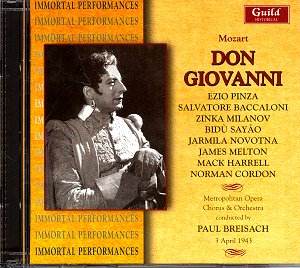This
issue differs from the 1942 recording, on Naxos Historical, in
two major respects. Firstly there is the presence of Baccaloni
as Leporello, and of Milanov, in her only recorded broadcast of
a Mozart opera, as Donna Anna. Baccaloni, born 1900, sang at the
‘Met’ from 1940 until 1962 and was widely considered the foremost
buffo of the period. From reports it certainly seems that he was
a superb actor whose interaction with his master, the suave and
vocally refulgent Giovanni of Pinza, was legendary. That is as
maybe, but it is not wholly conveyed on an audio CD particularly
when the singer is in poor voice; indeed his Catalogue Aria’ (CD1
tr.6) is very poorly rendered and his tone is thin elsewhere.
As to Milanov’s Anna, it is vocally formidable but in the wrong
manner. I cannot imagine this woman allowing the most violent
rapist to violate her. What’s more, I reckon she would not have
let her father fight the Don but would have sorted the matter
herself with pistol or sword as appropriate; try her ‘Ma qual
mai soffre’ (CD1 tr.3). The other major differences with the 1942
recording concern the Don Ottavio of James Melton and the conducting
of Paul Breisach who, put simply, is no match for Bruno Walter
on the rival issue. Melton is adequate rather than inspiring as
Ottavio, with some gracious phrasing in his arias (CD1 tr.8 and
CD2 tr10) and with enough metal in the lower voice not to sound
too much of a wimp.
Of
the other singers in the cast they are common with the 1942 performance.
I particularly enjoy the Zerlina and her vocal interplay with
the Giovanni; the tall Don and the tiny Bidú Sayão.
Both have appealing stage presence as well as being vocally secure.
They would have been highlights of the stage performance and this
is reflected in the density of the applause they get. Like the
complementary ‘Figaro’ from Guild, applause frequently disturbs
the dramatic flow. As to the interpolations, Richard Caniell suggests
that major problems had to be overcome before this broadcast could
be released, with the source discs representing the ‘Supper Scene’
in the penultimate portion of Act 2 being missing and likewise
2 minutes 30 seconds at the start of the Epilogue. Rather than
use the 1942 recording, and have Pinza singing with Kipnis as
Leporello, Guild has used the 1944 Szell recording. To overcome
the missing two plus minutes and get a reasonably seamless transition
Caniell has used a 1936 Glyndebourne with Steber replacing Novotna.
If that’s not enough, defects on the source discs has also meant
further substitution, in the Act 2 scene between Giovanni, Masetto
and Zerlina, using the 1942 broadcast. If you find such artistic
licence acceptable, then the overall sound of the performance
is subtly different, the broadcast originating from Chicago rather
than the Met itself.
This
issue is only really for those who want a record of Pinza and
Baccaloni in their renowned vocal interplay as master and servant
and also to hear how the great spinto Zinka Milanov tackled Mozart.
For me the 1942 performance under Bruno Walter will remain first
preference from this source.
Robert
J Farr
